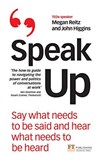- Behaviour
Speaking Up and Taking Heed
The vital importance to saying what needs to be said and hearing what needs to be heard
"Designed by clowns and supervised by monkeys" is how one Boeing employee described its 737 Max simulators in one of hundreds of internal messages, released in the wake of the Ethiopian Airlines crash, where Boeing workers speak frankly about the 737 Max airplane, their own company and the failings of the Federal Aviation Administration.

This is an extreme example but one of many―think VW, BP, and the Shrewsbury Hospital Trust―of the central thesis of Speak Up, a new book from Megan Reitz and John Higgins, that what people say and don’t say and how willing they are to really listen to others can have life-defining consequences on themselves and those around them.
In a workplace context speaking up, listening up, and maintaining transparent lines of communication can be key to corporate sustainability. An environment where fear-free ‘speaking truth to power’ aligns with a leadership that is ready to listen is not only likely to reveal malfeasance but will be conducive to performance improvement, innovation, and employee engagement. Furthermore, in today’s post-‘command and control’ organizations, where collaboration is key, there is more than ever an imperative for people at all levels to speak up.
From an individual’s point of view the choices made on who to speak to and when can have a profound effect on their ability to navigate corporate life and even on their career prospects. At a day-to-day level the success of the conversations we have at work and beyond affect our feelings of self-worth and value, causing us to feel motivated and engaged or dissatisfied and unfilled.
Drawing on research involving hundreds of interviews with employees at every level of business, survey results, and ethnographic studies, Speak Up explores the reasons why many people choose to stay silent and provides deep insight into the situational and power dynamics that inhibit or encourage us to speak up, speak truth to power, and listen to others. Using the mnemonic TRUTH as a framework for considering these dynamics the book offers practical advice for individuals and food for thought for business leaders.
How much do you Trust your own opinions and those of others? What Risks do you face in speaking up or do others face in speaking to you? Do you Understand the politics of who says what and why? How do the Titles or social labels we put on others and they put on us influence what is said or left unsaid? Do you know How to find the right words and best time to speak up or to invite others to speak to you?
The book is peppered with real-life examples including the occasion when Megan Reitz first met her new CEO. The organization she was working for as a senior member of staff had merged with another whose CEO was to be her new boss. Approaching the meeting with trepidation she initially failed to understand the balance of power. The CEO title disguised the fact that this new leader needed her commitment as much as she needed his.
About the authors: Megan Reitz is Professor of Leadership and Dialogue at Hult Ashridge Executive Education. John Higgins is Research Director at The Right Conversation.
…………………………………………………………………………………………………………………………….
‘Speak Up: Say What Needs to be Said and Hear What Needs to be Heard’, by Megan Reitz and John Higgins. Published by Pearson, 2019, ISBN 978-78764639
Hult Ashridge Executive Education helps organizations around the world improve their leadership talent, strategic thinking and organizational culture.
ARTICLES YOU MIGHT LIKE
BOOK REVIEW
An authoritative antidote to executive stress, overwhelm, and burnout
DEVELOPING LEADERS QUARTERLY MAGAZINE AND WEEKLY BRIEFING EMAILS


































